Serving 1,955 students in grades 10-12, Northridge High School ranks in the bottom 50% of all schools in Utah for overall test scores (math proficiency is bottom 50%, and reading proficiency is bottom 50%).
The percentage of students achieving proficiency in math is 24% (which is lower than the Utah state average of 39%). The percentage of students achieving proficiency in reading/language arts is 43% (which is equal to the Utah state average of 43%).
The student:teacher ratio of 26:1 is higher than the Utah state level of 21:1.
Minority enrollment is 32% of the student body (majority Hispanic), which is higher than the Utah state average of 29% (majority Hispanic).
Quick Stats (2025)
- Grades: 10-12
- Enrollment: 1,955 students
- Student:Teacher Ratio: 26:1
- Minority Enrollment: 32%
- Graduation Rate: 89% (Top 50% in UT)
- Overall Testing Rank: Bottom 50%
- Math Proficiency: 24% (Btm 50%)
- Reading Proficiency: 43% (Top 50%)
- Science Proficiency: 34% (Btm 50%)
- Source: National Center for Education Statistics (NCES), UT Dept. of Education
School Overview
Northridge High School's student population of 1,955 students has stayed relatively flat over five school years.
The teacher population of 75 teachers has stayed relatively flat over five school years.
Grades Offered
Grades 10-12
Total Students
1,955 students
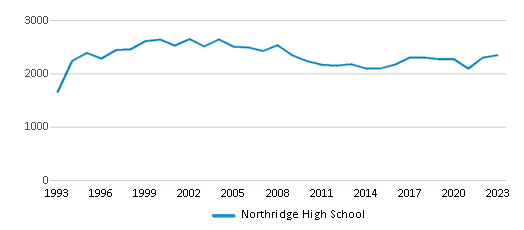
Gender %
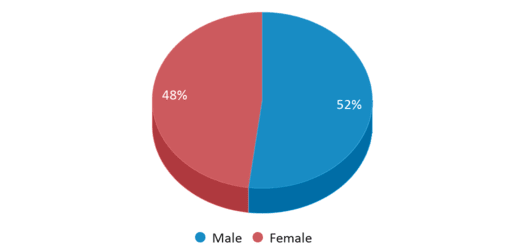
Total Classroom Teachers
75 teachers
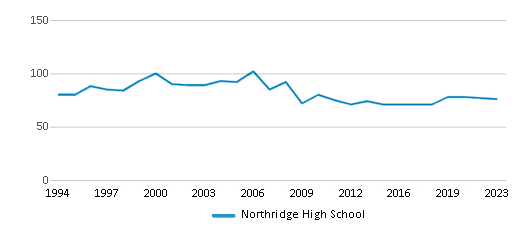
Students by Grade
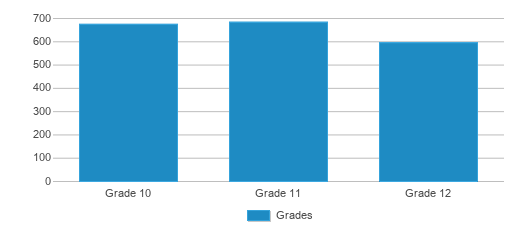
School Rankings
Northridge High School ranks within the bottom 50% of all 975 schools in Utah (based off of combined math and reading proficiency testing data).
The diversity score of Northridge High School is 0.49, which is more than the diversity score at state average of 0.46. The school's diversity has stayed relatively flat over five school years.
Overall Testing Rank
#636 out of 975 schools
(Bottom 50%)
(Bottom 50%)
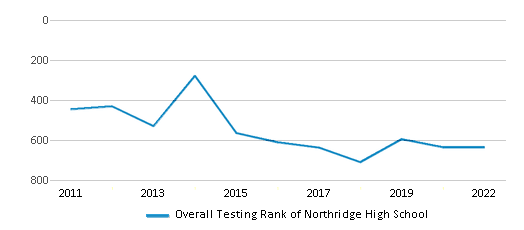
Math Test Scores (% Proficient)
(20-21)24%
39%
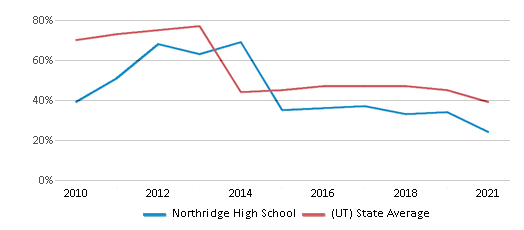
Reading/Language Arts Test Scores (% Proficient)
(20-21)43%
43%
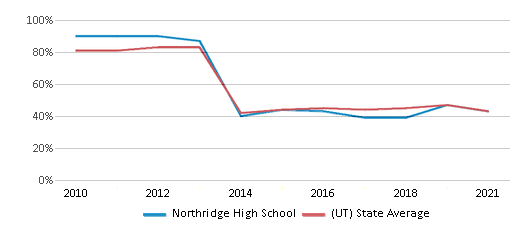
Science Test Scores (% Proficient)
(20-21)34%
45%
Student : Teacher Ratio
26:1
21:1
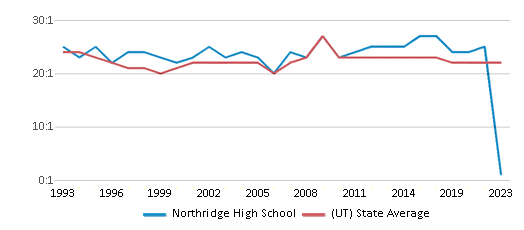
American Indian
1%
1%
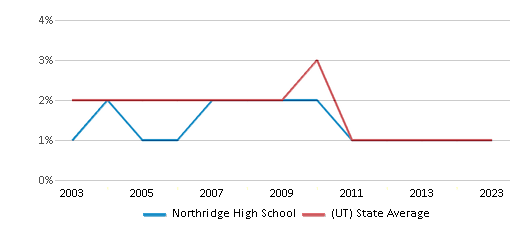
Asian
1%
2%
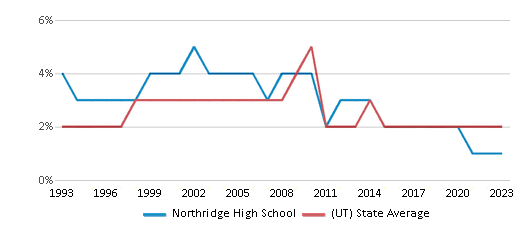
Hispanic
23%
20%
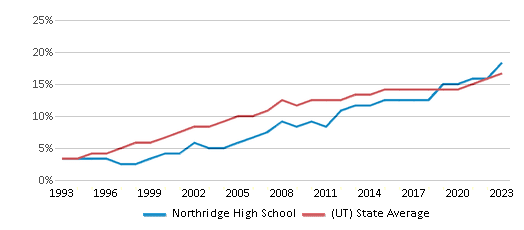
Black
2%
1%
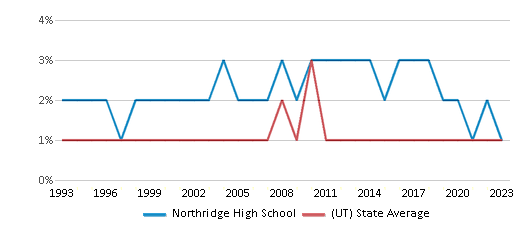
White
68%
71%
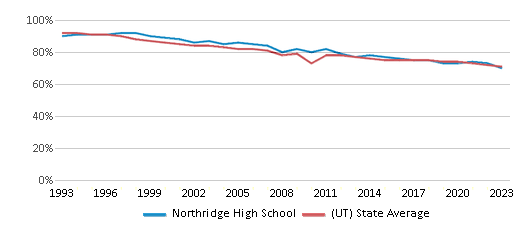
Hawaiian
1%
1%
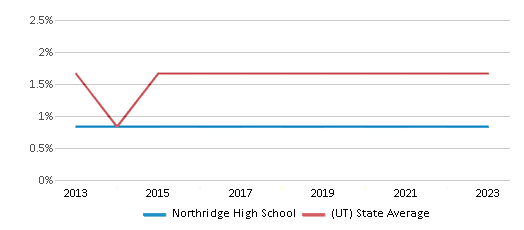
Two or more races
4%
4%
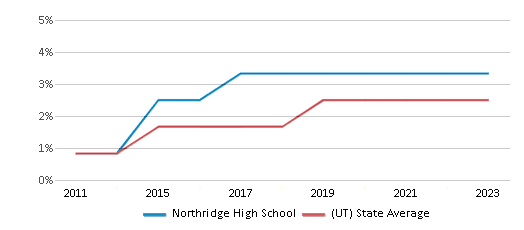
All Ethnic Groups
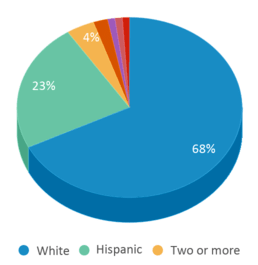
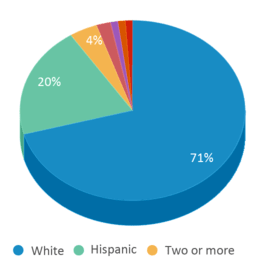
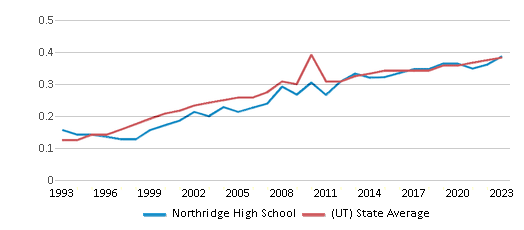
Graduation Rate
89%
88%
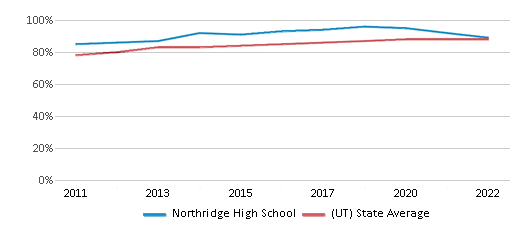
Eligible for Free Lunch
21%
24%
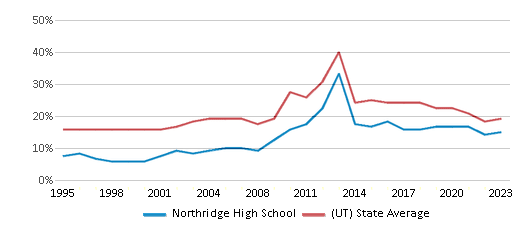
Eligible for Reduced Lunch
5%
6%
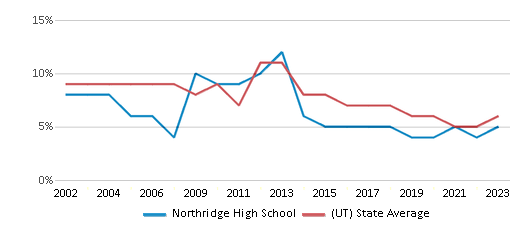
School Statewide Testing
School District Name
Source: National Center for Education Statistics (NCES), UT Dept. of Education
Profile last updated: 02/09/2025
Frequently Asked Questions
What is Northridge High School's ranking?
Northridge High School is ranked #636 out of 975 schools, which ranks it among the bottom 50% of public schools in Utah.
What schools are Northridge High School often compared to?
Northridge High Schoolis often viewed alongside schools like Layton High School by visitors of our site.
What percent of students have achieved state testing proficiency in math and reading?
24% of students have achieved math proficiency (compared to the 39% UT state average), while 43% of students have achieved reading proficiency (compared to the 43% UT state average).
What is the graduation rate of Northridge High School?
The graduation rate of Northridge High School is 89%, which is higher than the Utah state average of 88%.
How many students attend Northridge High School?
1,955 students attend Northridge High School.
What is the racial composition of the student body?
68% of Northridge High School students are White, 23% of students are Hispanic, 4% of students are Two or more races, 2% of students are Black, 1% of students are American Indian, 1% of students are Asian, and 1% of students are Hawaiian.
What is the student:teacher ratio of Northridge High School?
Northridge High School has a student ration of 26:1, which is higher than the Utah state average of 21:1.
What grades does Northridge High School offer ?
Northridge High School offers enrollment in grades 10-12
What school district is Northridge High School part of?
Northridge High School is part of Davis School District.
School Reviews
2 4/29/2022
Northridge has a large number of students who either don't have food or is struggling to obtain food. we do have resources at school, but not many students know we have a food pantry, or they are too afraid to ask because no one talks about it. There's not enough recognition for the fact that we HAVE the RESOURCES, it creates a stressful learning problem when these kids cant ask for help because they don't know how or they are afraid.
4 10/13/2020
Great school overall. Great administration, teachers, counselors, etc. I will be sending ALL of my kids there.
5 4/6/2019
Teachers are nice love the the school 9/10 uncooked spaghetti noodles.
2 5/30/2011
The teachers and counselors at this school are either overwhelmed by too many struggling students, or are simply not willing to work with those that do. At this point I know there are many students in the last two years who did not graduate for one reason or another. How successful is a school that consistently has good students dropping out?
Review Northridge High School. Reviews should be a few sentences in length. Please include any comments on:
- Quality of academic programs, teachers, and facilities
- Availability of music, art, sports and other extracurricular activities
Recent Articles

What Is A Charter School?
Explore the world of charter schools in this comprehensive guide. Learn about their history, how they operate, and the pros and cons of this educational innovation. Discover key facts about charter schools, including admission policies, demographics, and funding, as well as what to look for when considering a charter school for your child.

10 Reasons Why High School Sports Benefit Students
Discover the 10 compelling reasons why high school sports are beneficial for students. This comprehensive article explores how athletics enhance academic performance, foster personal growth, and develop crucial life skills. From improved fitness and time management to leadership development and community representation, learn why participating in high school sports can be a game-changer for students' overall success and well-being.

February 05, 2025
Understanding the U.S. Department of Education: Structure, Impact, and EvolutionWe explore how the Department of Education shapes American education, from its cabinet-level leadership to its impact on millions of students, written for general audiences seeking clarity on this vital institution.





